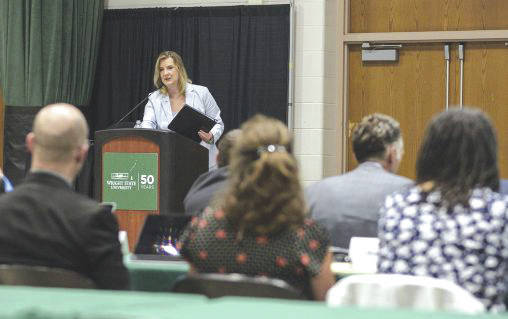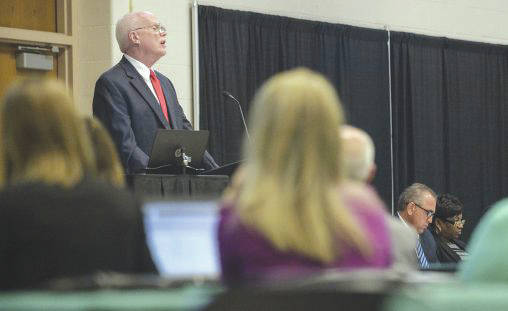

FAIRBORN — Emerging from years of overspending and budget deficits, Wright State University will post a $7.2 million budget surplus this year and has crafted a fiscal 2019 budget with a $3 million surplus that earmarks funds for strategic investments to bolster tuition revenue and build the university’s future.
The information was part of the fiscal 2019 budget presentation made June 8 by President Cheryl B. Schrader and Walter J. Branson, vice president for finance and operations and chief business officer, to the Board of Trustees.
The trustees approved the budget by a vote of 7-to-1.
“Our success is apparent,” Schrader told the trustees. “We will end the year with a $7.2 million surplus to be added to our critically low reserves rather than deficit balances as was the practice in previous fiscal years. This year, together, we have changed a culture of overspending and delivered on our commitment to fiscal responsibility and accountability.”
Schrader said the $7.2 million surplus will exceed the $6 million surplus originally budgeted and will be the first surplus since fiscal 2013. By June 30, the end of fiscal 2018, it is expected Wright State will have spent $50 million less than it did the previous year, exceeding the $30.7 million reduction called for in the original budget.
“Last year at this time it was a certainty that we would go onto fiscal watch,” Schrader said. “Today, with three weeks to go in the fiscal year, we are on track to avoid fiscal watch altogether.”
Avoiding fiscal watch would enable the university to achieve financial sustainability in its own time and use some of its resources to invest in its future.
Schrader said the fiscal 2019 budget is a challenging one.
“It continues to protect our academic core while proactively addressing revenue challenges and the need to buttress against any future unexpected or previously unbudgeted expenses,” she said. “While it is tough, it is also realistic and demonstrates a budget strategy that differs from previous years.”
The preliminary fiscal 2019 budget assumes that state support will decline 1.61 percent — a $1.4 million decrease from fiscal 2018 — and that enrollment credit hours will decline by 6.2 percent.
The budget projects revenue of $277.6 million, which includes $164.8 million from tuition and $84.6 million from the state. That compares to previous revenues of $306 million in fiscal 2017 and $287 million in fiscal 2018.
Expenses in fiscal 2019 are expected to total $274.6 million, leaving the $3 million surplus.
Objectives of the fiscal 2019 budget include maintaining the instructional and educational components of the university’s mission as the highest priority; continuing to restore reserves; providing funding for strategic investments; and continuing to emphasize a strong culture of fiscal accountability.
Under the budget, there will be no annual increases in salaries and wages. Promotion and tenure salary increases will continue.
There will be no tuition increases for resident undergraduate students, a 3 percent increase for non-resident undergraduate students and graduate students, and a 6 percent increase for the incoming cohort of students in the Wright Guarantee Tuition Program, which guarantees the same annual cost of tuition, housing and dining over a four-year college career for newly admitted, degree-seeking undergraduate students who are Ohio residents.
Wright State continues to rank among the most affordable for in-state undergraduate students, at $8,730 per year.





